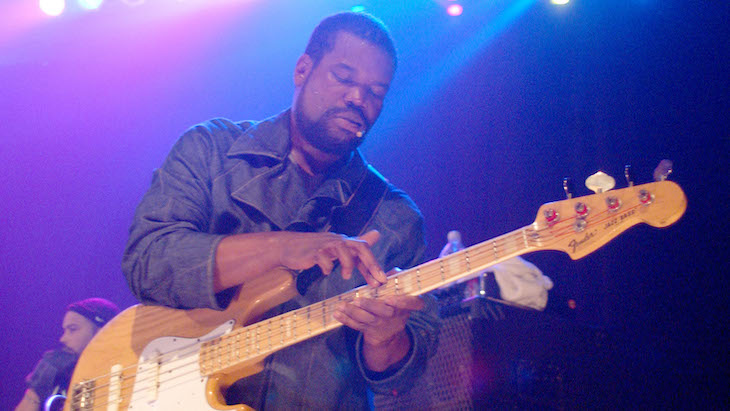
Former Roots Bassist Leonard “Hub” Hubbard Passes Away
Former member of The Roots, Grammy Award-winning bassist and songwriter Leonard “Hub” Hubbard has died after complications from multiple myeloma, a type of blood cancer. Hub’s wife told Philadelphia, Pennsylvania’s ABC 6, “It happened quickly. He didn’t suffer a lot.” Hub played with the group from the mid-1990s until the mid-2000s, including on their acclaimed Things Fall Apart as well as live Roots sessions with JAY-Z, Eminem, and others. He also worked on albums by MC Solaar, the Jungle Brothers, and Jaguar Wright. Hub, a graduate of Pittsburgh’s Carnegie Mellon music program, was a fixture of the band during his tenure, remembered for his incredible bass playing and his trademark chew stick.
Hub grew up in close proximity to Philly musical legends like Kenny Gamble, Leon Huff, and the members of M.F.S.B. Hubbard joined The Roots ahead of their studio debut album when the busking act and jam band previously featured Josh “The Rubberband” Abrams, who left the act to pursue college. Since Hub stepped away from The Roots after Game Theory, the band has had several musicians at the bass. A 2016 legal document claimed that In 2007 Hubbard left the group due to his diagnosis. At that time, he sued his former band-mates in a high-profile royalty dispute.
Questlove Gives The Inside Story Behind The Making Of Things Fall Apart
“Music is all about what you’re exposed to, and I’ve been exposed to many different things,” Hub told Bass Player in 2003. He credited Charles Mingus, Larry Graham, Jaco Pastorius, and the Blues-Rock band Cream as influences. In that interview with E.E. Bradman, which was published not long after Phrenology released, Leonard also shared, “If you want to play Hip-Hop bass, you have to own a beat machine, you have to know the metronome, and you need some sense of rhythm and timing. But here’s the main thing: You have to listen to yourself play. Record yourself playing a bass line for five minutes. If you can play something fast, then try playing it slow, melodically and groovin’, and make it sound just as good as it did when you played it fast. Listen to it and hear where your playing got weak, and ask yourself why three minutes later you played a fill that messed up the pocket. Even bassists who listen to Hip-Hop sometimes don’t understand the discipline, because once they get onstage and start feeling it, they think, The faster I play, the more exciting! But playing hip-hop is a different discipline. It’s all about listening, understanding the pocket, and knowing your place in it.” He famously played an upright on the early works, explaining, “I played upright on the first two albums, because that was the Hip-Hop sound then. But the upright isn’t designed for loud stages, or at least it wasn’t back then—I more or less had a microphone sitting on top of the bridge. Questlove’s bass drum would make my mic feedback before I even starting playing. Technology has gotten better, but my upright is looked at as an expense, and I can’t afford to carry it around. I’d love to bring it back, though.” On later albums, he involved an electric bass in his arsenal.
In 2020, another former Roots member, MC Malik B, died at age 47. No cause of death was made public.
20 Years Later, The Roots Continue to Do What They Do Best: Shine For Hip-Hop (Video)
Ambrosia For Heads extends condolences to Hub’s family, The Roots, and all who knew him and his music.